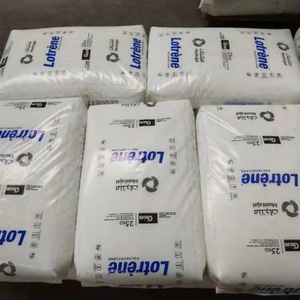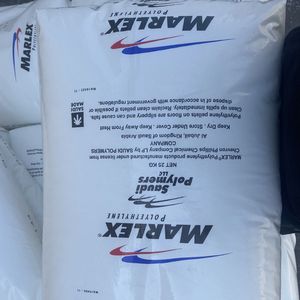(3095 products available)




















































































































































































































Granule is a term that refers to solid particles or grains, frequently found in bulk when discussing granule materials. Granules are typically small, rounded particles, often compared to grains. Plastic granules are small, round pellets that are the raw material for molding items manufactured from plastic. HDPE plastic granules for bottle caps has diverse applications and can be molded and extruded into various shapes and products.
The properties of HDPE, such as impact resistance, lightweight, flexibility, tensile strength, moisture barrier, and chemical resistance, make it a suitable plastic for bottle caps.
HDPE plastic granules are manufactured as small pellets and are melted down into a liquid when heated and injected into a cap mold. When cooled, the bottle cap is produced. The caps made of HDPE granules are resilient, sturdy, and dependable. They are designed not to deform when the bottle is opened and closed repeatedly.
HDPE plastic caps granules can be sorted into categories as follows:
HDPE plastic granules' specifications are based on their physical and chemical properties. Specific parameters regarding HDPE granules for bottle caps may vary by supplier and product, but the following are common.
The maintenance of the HDPE plastic bottle cap granules is closely related to storage and transportation, and the maintenance methods are as follows:
HDPE plastic granules for bottle caps are used in various industries. Here are some prominent application scenarios for HDPE plastic granules for bottle cap manufacturers.
Food and beverage industry
The food and beverage industry is one of the biggest industries that use HDPE plastic granules for bottle cap production. HDPE offers great resistance to chemicals, making it very suitable for producing bottle caps for beverages and other food products. Besides this, HDPE is non-toxic, which makes it safe for use in sealants for food or drink containers.
Pharmaceutical industry
Similarly, the pharmaceutical industry uses HDPE plastic granules to manufacture bottle caps for medicine. Bottle caps for medicine are usually manufactured with high-density polyethylene to enhance quality and ensure maximum durability.
Personal care and cosmetic industry
The personal care, cosmetic, and toiletries also utilize HDPE granules to manufacture bottle caps for shampoo bottles, lotion bottles, and other personal care products. HDPE offers great protection against external contaminants, which keeps product integrity intact.
Chemical industry
In the chemical industry, HDPE plastic granules are used to produce caps for chemical containers or bottles. HDPE is very resistant to harsh chemicals and provides great sealing properties. It also safeguards the content from UV rays and external environmental factors.
Construction industry
HDPE plastic granules are also used in the construction industry. Granules are used to produce caps for construction bottles or containers. HDPE bottle caps for construction are known for their strength and ability to withstand high impact.
When looking for HDPE granules for bottle caps, buyers need to find quality products that meet international standards and ensure superior end products. To achieve this, they should begin by researching the reputable manufacturers or suppliers on the market. In doing so, they will locate those that have already established a positive image and are known to produce and supply quality HDPE granules cap. Such suppliers will have met all the requirements of the industry, meaning they supply products in line with global standards.
After this, buyers should go further and inquire about the specific characteristics their HDPE cap granules possess. They should ensure that the products offered have strong and stiff qualities, as bottle caps need such characteristics to hold the bottle firmly. They should also check for granules with excellent impact resistance. This is considered paramount, especially for bottle caps, as they need to resist breaking or cracking under the pressure of constant opening and closing.
If looking to purchase colored HDPE granules, buyers should ensure that individual granules have uniform coloring and consistency. They should also ensure that the color intensity is even throughout the entire batch. Additionally, buyers should go for those HDPE granules with good flow properties. Such properties ensure even distribution in the molding cavity when manufacturing bottle caps through injection molding methods.
Finally, buyers should place a small order first and evaluate the supplier's product before placing a large order. In this way, they will be able to test the performance and quality of the bottle cap made from the granule. If satisfied, they can go ahead and place a bulk order.
Q1: What is HDPE plastic granule?
A1: HDPE plastic granule is a small, measurable, and unprocessed HDPE plastic material. It has a higher density than other plastics. HDPE is highly resistant to impact and can undergo a high level of temperature without splintering or breaking. One of the distinguishing factors of HDPE granule is that it has no harmful chemical elements that can leak into the content of a bottle. This makes it ideal for packaging food products.
Q2: Why HDPE granules are used?
A2: HDPE plastic granules for bottle caps are a popular choice due to their strength, rigidity, and high impact resistance. They offer an excellent barrier against moisture, gases, and chemicals. They are easy to clean and sterilize, making them ideal for products that require a high level of cleanliness, such as medicines and chemicals. They are also wear-resistant and can withstand harsh environments, including exposure to salts, alkalis, and acids.
Q3: What are HDPE plastic granules?
A3: HDPE plastic granules are small pellets created during the plastic manufacturing process. They are melted down and molded into the desired shape. In simple terms, plastic granules are the building blocks of plastic products.